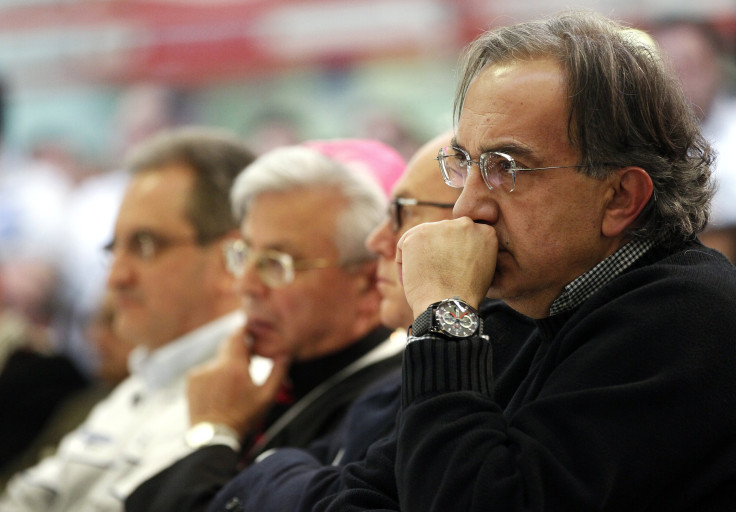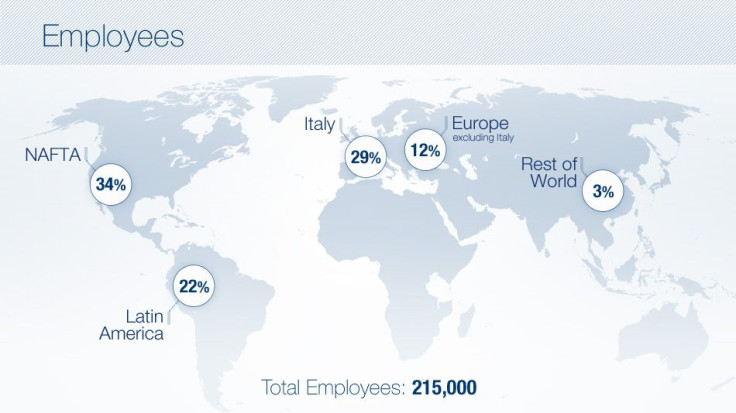Fiat-Chrysler’s Sergio Marchionne: Revered In Detroit, Reviled In Italy

TOLEDO, Ohio -- On a hot day in early June 2011, President Barack Obama was visiting the Jeep plant in the middle of this city hit hard by the recession. He had come to tout the success of his auto bailout plan. Italy’s Fiat had just announced that it was buying the Treasury’s remaining 6 percent stake in Jeep’s parent, Chrysler, paying $500 million to raise its holding to 52 percent. The automaker that had been on the verge of disappearing just two years earlier was now making an operating profit and hiring workers back, and Obama was beaming as he addressed hundreds of workers and managers. “Toledo, you showed that this was a good investment, betting on America’s workers,” he proclaimed, to roaring applause.
The Italians came to Detroit in 2009 to invest in a bankrupt Chrysler, and now officially owned an American icon. The man behind the takeover, Fiat (BIT:F) and Chrysler CEO Sergio Marchionne, was in the audience that day and got a standing ovation as loud as Obama's. To the Italian reporters in attendance, part of the pack that follows their countryman's every public event in the U.S., the enthusiasm was baffling. Back home, where antagonism between labor and management runs high, manufacturing bosses get booed, not applauded. And while the press in Detroit can barely hide its admiration for Marchionne, newspapers in Italy -- where Fiat is losing sales and laying off workers -- carry a lot of antipathy toward the CEO.
"Sergio Marchionne is the most reactionary expression of the arrogance of capitalists," a left-wing member of Parliament named Angelo Bonelli once said. That’s a good summation of how the Fiat boss is seen by many on Italy's left. Animosity toward Fiat is nothing new; Italy is, after all, where Red Brigades terrorists in the 1970s frequently gunned down corporate executives considered enemies of the proletariat. Many of the victims worked for Fiat. Armed extremism, to be sure, has long been defeated in Italy, and no public figure is advocating violence against Marchionne -- but some of that mindset lingers. “Class struggle still has a large following in Italy,” said Fabiano Schivardi, a professor of Economics at Rome’s LUISS University who studies labor and industrial organization.
Yet, the nation’s largest private-sector employer may well owe its continued existence to Marchionne. When he became chief executive in 2004, Fiat had just lost a cumulative $8 billion over two years and was on the verge of being taken over by the banks whose loans were keeping it afloat. A strategic alliance with General Motors (NYSE:GM) had gone sour, but Marchionne negotiated his way out of it, even managing to wrest a $2 billion payment from the Americans that helped bring the company back to profit in 2005. A complete unknown to the Italian public, Marchionne burst onto the scene with that GM deal -- and for a few years, enjoyed the popularity that came from rescuing the country’s top industrial player.
Marchionne “saved the company,” said Paolo Griseri, a journalist who covers Fiat for the Italian daily La Repubblica and author of a history of the automaker under Marchionne. The new CEO was a smash hit. When a new assembly line was inaugurated in 2006 at the Fiat plant in Mirafiori, near Turin, “it was a huge celebration. Every politician and union leader, even the hardliners, was there,” Griseri recalled. The following year, Fiat launched a new model, the 500, reprising the styling of the tiny, cute 1950s car of the same name that every Italian knew and loved. It was a huge success. “That was the apotheosis. That’s when he was really popular,” Griseri said. “But it lasted about three years.”
Two Passports
But Marchionne never fit the mold of a classic Italian business leader, tight with politicians and well-versed in the intricacies of running a company in a heavily regulated economy and a society where appearances matter a lot. Strictly speaking, he isn’t completely Italian, either -- something you could tell by his utter dislike of suits and ties, and permanent uniform consisting of dark slacks and a dark crewneck sweater worn over a button-down shirt.
Born in 1952 in the poor, rugged region of Abruzzo east of Rome, he emigrated with his family at age 14 to Canada, graduating in philosophy and then adding a law degree and an MBA, as well as Canadian citizenship on top of the Italian passport he retained. Officially he is a resident of Switzerland, where he pays taxes.
His real homeland, though, is in the air, logging untold miles in the corporate jet that shuttles him and a multinational management team among the Fiat-Chrysler group’s locations (besides Italy and the U.S., the company has manufacturing plants in Canada, Brazil, Mexico, Argentina, Serbia and Poland.) He may well be the first truly delocalized, completely global CEO in the auto industry, even more than Carlos Ghosn, the Franco-Brazilian-Lebanese head of Nissan Motor Co (TYO:7201) and Renault SA (EPA:RNO) who shuttles constantly between Paris and Tokyo.
“Our management team, with 22 executives from nine countries, will be a band of nomads, traveling permanently,” Marchionne said, in an interview with La Repubblica. That globalist approach, untethered from national affiliations and dedicated to building vehicles where it’s cheaper and markets are stronger, goes over well with investors. Fiat shares gained 53 percent on the Milan stock exchange in the year to Jan. 17, 2014. But it’s also what got him in trouble with Italians who bemoan the loss of Fiat jobs, and found a perfect culprit in the man who may have saved the company, but lost much of Fiat’s factory-worker employment in Italy. The group says it employs 62,000 people in the country, or 29 percent of the total, but blue-collar jobs on the assembly lines are down to around 24,000. And with the purchase of Chrysler, the center is moving from Fiat’s historical Turin headquarters to Detroit: The biggest share of the group’s employees, 34 percent, is now in North America (including Mexico.)

Marchionne Vs. Landini
The prospect of a global Fiat letting go of its Italian roots is precisely what upsets traditionalists like Maurizio Landini, who leads FIOM, the manufacturing workers’ union affiliated with CGIL, Italy’s biggest labor organization by membership. FIOM has sued Fiat dozens of times since Marchionne took over, alleging among other things that the company fired union activists in retaliation.
Relations between Marchionne and Landini began to go south in 2010, according to Griseri. That’s when workers at a Fiat plant in Pomigliano, near Naples, voted in favor of a company plan promising renewed investment in the factory in exchange for concessions on costs and labor conditions. FIOM was against. Moderates within CGIL had assured Marchionne that the hardline FIOM would go with the plan if it won the vote, but Landini did not. “Some groups are more at ease with a brawl than with an agreement,” Griseri said.
Fiat blue-collar employees are represented mainly by four unions, three of which went largely for the Marchionne plan. That’s a far cry from the U.S., where manufacturers deal only with one labor group, the United Auto Workers. “One of the differences with the U.S. is that in Italy we have several unions, and the one that’s farthest to the left benefits from going it alone. It pays, literally,” said Schivardi.
Then, the Fabbrica Italia fiasco happened. In 2010, Marchionne announced an ambitious, 20-billion-euro, five-year investment plan that would revamp Fiat’s presence in Italy, almost tripling the number of cars it produced in the country and hiring back most of the workers it had laid off. The plan’s announcement squelched rumors that Fiat would move its headquarters out of Italy -- but two years later, the company officially abandoned it. The European auto market had collapsed, and Fiat’s production numbers in Italy had actually fallen, from 650,000 cars in 2009 to just 400,000 in 2011. Marchionne said he had no choice but to scrap the plan in the face of a bitter crisis. Landini didn’t buy it. “That plan was not a mistake, it was fraud," he said in 2012. “Fiat is shifting its attention to other countries,” he added.
Marchionne has repeatedly dodged the question of where the new Fiat-Chrysler, once the merger is completed later this month, will be based. “We will have many heads, in Turin, Detroit or Brazil, and I hope in China, but one heart,” he told La Repubblica in 2011, without specifying further. The issue is huge in Italy, where keeping the headquarters of Fiat-Chrysler is seen as a matter of national pride. “The Italian press has been asking obsessively where the headquarters will be,” said the group’s chief spokesman Gualberto Ranieri by phone, “but that’s immaterial.” Marchionne has decided to split the group into four geographical regions, each with its own corporate and operational structure, so “it doesn’t really matter where the actual headquarters is,” Ranieri said. “That may not be how companies are usually organized, but Fiat-Chrysler is unusual.”
America Trumps Europe
Wherever the future headquarters may be, it’s clear where Fiat-Chrysler is doing well these days, and that’s not in Italy, or for that matter in Europe. Auto sales on the continent fell 2 percent in 2013, the sixth consecutive year of decline and the worst in terms of vehicles sold since 1995, according to data released by the European Automobile Manufacturers’ Association. Fiat sales fell 1.6 percent; the group’s other major brands fared even worse, with Jeep down 13 percent, Lancia / Chrysler down 20, and Alfa Romeo a whopping 28. But in the same year, auto sales in the United States rose 7.6 percent. Chrysler, including Fiat (which in the U.S. sells only the 500, produced in Mexico), outpaced the market with a 9 percent jump in cars and trucks sold, according to Motor Intelligence.
But the writing is on the wall: if European sales don’t pick up, the newly merged Fiat-Chrysler (the company will have a new name, as yet unannounced) is likely going to shift more and more of its focus to where the market is stronger. Marchionne, in what may have been a Freudian slip, told an interviewer in 2010 on Italy’s state-owned RAI network that “Fiat would do better without Italy.” He later clarified his statement, saying that the company wasn’t even thinking of decamping.
Still, the problem between Marchionne and his Italian critics may be more profound than a failed plan or the location of a corporate office. He has admitted as much himself. “We speak different languages,” he told La Repubblica. “I talk about today’s reality in the global world, FIOM about the reality of the past.”
© Copyright IBTimes 2024. All rights reserved.






















